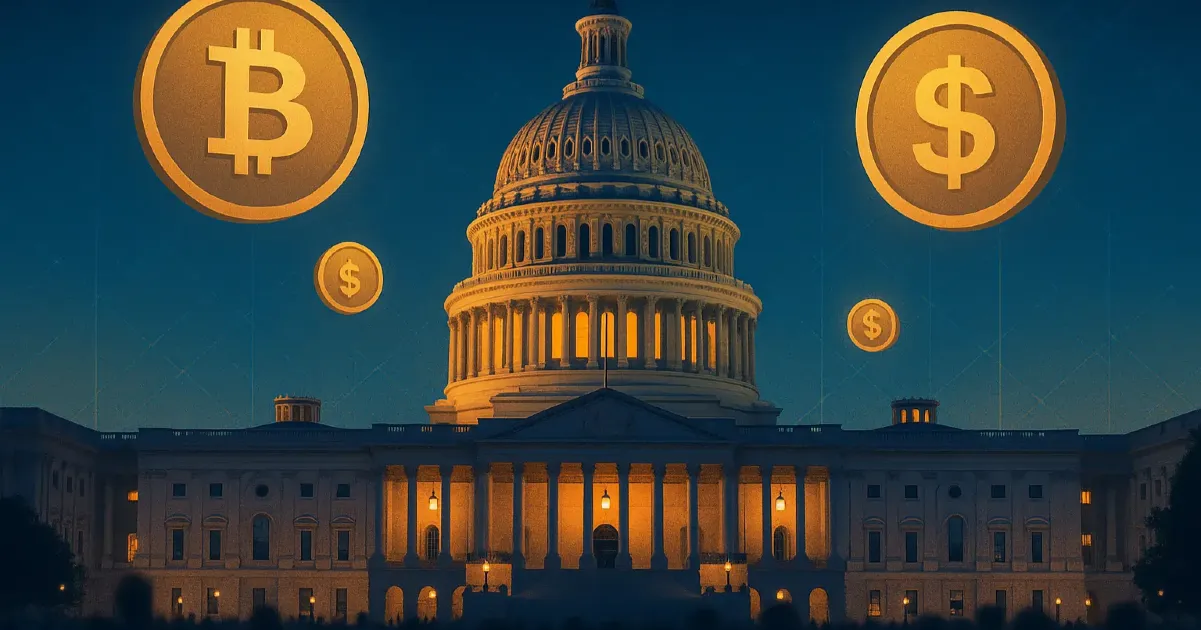House passes procedural vote reviving three crypto bills on stablecoins, market structure, and CBDC ban amid Trump tension and party divisions.
A Quiet Yet Pivotal Moment for Crypto Legislation
In a moment that could reshape America’s crypto regulatory landscape, the U.S. House of Representatives has officially revived three landmark crypto bills just a day after the same measures stumbled in a dramatic floor vote. While Wednesday’s narrow 215-211 vote may not seem headline-grabbing on the surface, it potentially marks a foundational shift in how digital assets will be regulated, traded, and developed in the United States.
Despite the high-profile involvement of U.S. President Donald Trump and growing momentum behind digital asset regulation, the vote once again revealed fractures within the Republican ranks. Not all GOP members followed Trump’s lead; five Republicans broke away from party lines, creating political turbulence around what should have been a unified crypto push.
What’s Actually on the Table?
The package of bills that cleared the procedural hurdle includes
- The GENIUS Act – Short for the "Guiding and Establishing National Innovation for US Stablecoins "Act"—this bill seeks to provide a clear regulatory framework for payment stablecoins. It addresses concerns around who can issue these tokens, how they are backed, and under which federal bodies they would be regulated.
- The Financial Innovation and Technology for the 21st Century Act (FIT21)— Often described as the “crypto market structure” bill, FIT21 would define the roles of agencies like the SEC and CFTC in regulating crypto assets. It’s meant to resolve long-standing confusion about whether digital assets are securities, commodities, or something else entirely.
- The Anti-CBDC Surveillance State Act – A measure that would effectively ban the Federal Reserve from issuing a U.S. central bank digital currency (CBDC) without explicit congressional authorization.
These three pillars are seen by many within the crypto industry as vital steps toward legitimizing digital assets in the U.S. market while preventing overreach from regulatory agencies.
Political Infighting and Missed Votes
The road to this procedural win wasn’t smooth. Just 24 hours earlier, the same bills were shot down when 13 Republicans defected from party lines. Several of them voiced concerns over what they viewed as weak language in the GENIUS Act, particularly around banning the creation of a U.S. CBDC a red line for many conservative lawmakers and libertarian-leaning crypto advocates.
President Trump, who has recently adopted a more crypto-friendly stance and whose family is now tied to blockchain ventures through World Liberty Financial, failed to unify the Republican caucus. Despite public and behind-the-scenes lobbying, five Republicans still voted "no" on Wednesday’s motion.
This outcome suggests that while Trump has embraced crypto as a populist issue, framing it as part of a broader anti-establishment narrative, his sway over the party remains inconsistent, especially when it comes to nuanced legislative topics like stablecoin issuance and financial regulation.
Why This Matters
Wednesday’s vote doesn’t immediately pass the bills into law. It merely reopens the legislative door. However, this action signals a clear appetite within Congress, especially among Republicans, to address crypto before lawmakers leave for the August recess.
With Democrats largely holding the line in opposition, the GOP must either resolve its internal conflicts or court moderate Democrats who may be open to compromise. As the GENIUS Act has already demonstrated, having failed its Senate cloture vote before eventually passing, bipartisanship, or at least political finesse, is still necessary in today’s divided Capitol.
The Battle Over Stablecoins and CBDCs
The GENIUS Act has become the most contentious of the three bills. On one hand, it offers long-awaited guidance for companies like Circle and Tether, as well as legacy finance firms like JPMorgan and Bank of America, which are exploring their own stablecoin offerings. On the other, it has sparked alarm among anti-CBDC conservatives who fear the U.S. government could one day create a surveillance-focused digital dollar.
Critics argue that the bill doesn’t go far enough to explicitly ban the creation of a Fed-backed CBDC, leaving the door open for future interpretations. This has alienated some Republicans and made it a point of leverage for Democrats who want stronger oversight and consumer protections built into the legislation.
Market Implications: Clarity vs. Chaos
From a market perspective, the procedural vote gives the crypto industry a reason to exhale. Regulatory clarity, especially around market structure, has long been viewed as a gating factor for broader institutional adoption. With clear rules, more traditional investors may be inclined to enter the space without fear of sudden SEC crackdowns or regulatory ambiguities.
At the same time, the current version of the bills does not fully satisfy either side of the debate. Proponents of DeFi worry that the FIT21 bill could entrench incumbents and disadvantage open-source protocols. Meanwhile, anti-regulation hardliners view even modest oversight as a slippery slope.
Still, the fact that the bills are back on the table suggests that Washington is inching toward a legislative framework, imperfect as it may be, that could normalize the presence of crypto in everyday financial life.
What Happens Next?
Now that the procedural vote has passed, the House can move to debate, amend, and ultimately vote on the final versions of each bill. This could happen quickly before the August recess or stall once again if party lines harden or procedural tactics are used to delay proceedings.
If the House passes the bills, they would then move to the Senate, where the outlook is murkier. The GENIUS Act already had a rocky path in the Senate, and crypto skepticism remains strong among some Democrats.
But time is of the essence. As the 2024 election cycle heats up, every legislative victory or failure will be weaponized on the campaign trail. Crypto, for better or worse, has become a political football, and both parties are trying to score.
A Turning Point or Another False Dawn?
For crypto entrepreneurs, investors, and users, this moment offers cautious optimism. There’s clear movement on long-stalled issues. At the same time, familiar warning signs of internal divisions, lobbying pressure, and partisan bickering remain.
Still, the idea that the House may vote on comprehensive crypto legislation before summer’s end would have been unthinkable even 12 months ago. Regardless of the outcome, the signal is clear: crypto is no longer a fringe issue. It’s now part of the national economic conversation, and that alone is progress.
Final Thoughts
While the final shape of these bills is far from certain, their advancement signals a notable evolution in U.S. crypto policy. The legislative process may still be rocky and filled with unexpected detours, but the road is finally being paved.
For those in the crypto space, the time to engage with lawmakers and educate the public is now. Regulation is no longer a hypothetical; it’s unfolding in real time, one floor vote at a time.






